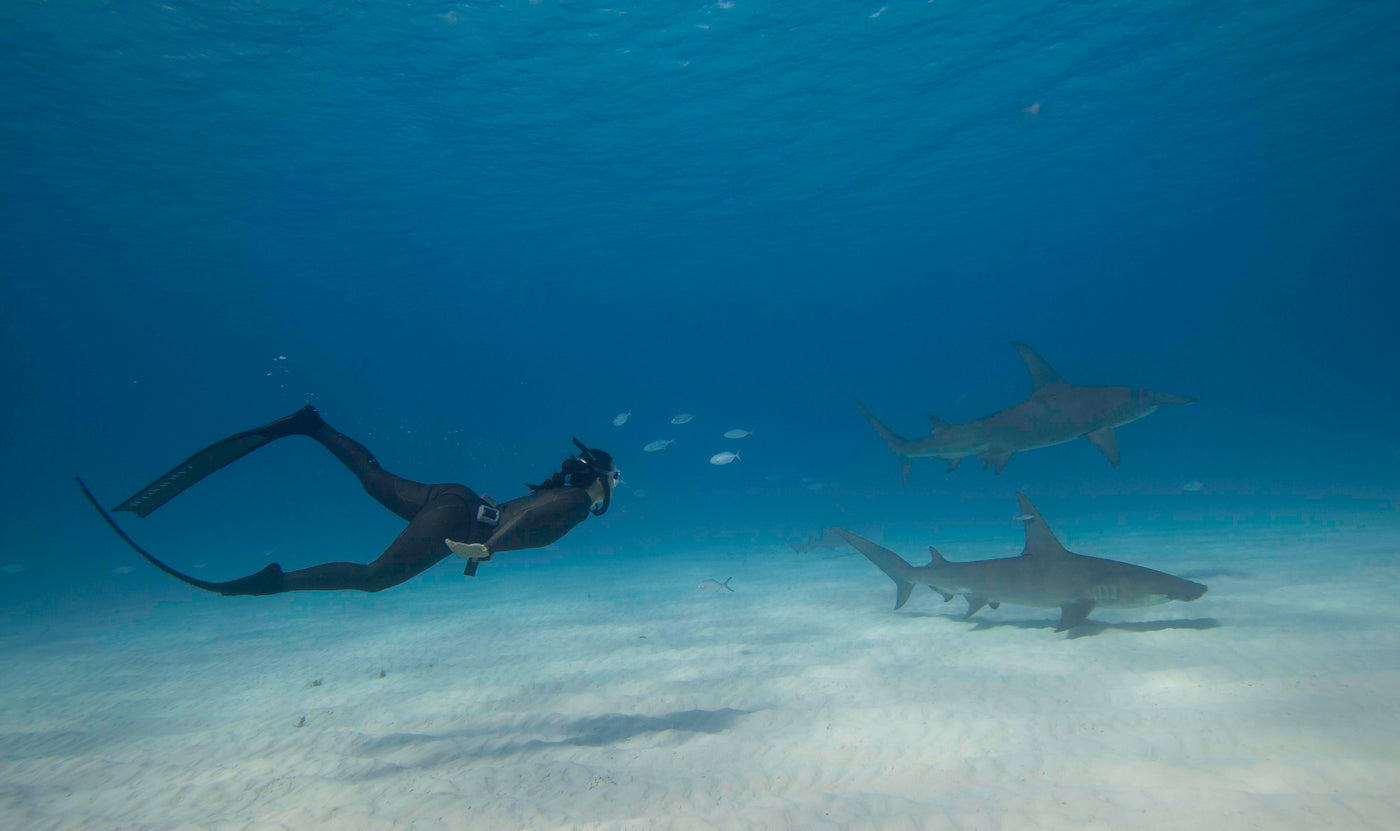FAQs
Freediving
What is Freediving?
What is Freediving?
Freediving is an age-old practice of exploring the ocean on one breath – often called APNEA. With its roots in subsistence living off the sea, freediving is today a competitive sport with disciplines, competitions and records. But in essence it is just the act of holding your breath underwater.
Why freediving and not scuba diving?
Why freediving and not scuba diving?
We love scuba diving and do it ourselves, but we also find freediving offers unique, like these 5 things...
1. connection to your own body (keeps you fit, learn about limitations and see improvement),
2. silence underwater,
3. connection to marine animals (animals are more curious when there are less noisy bubbles),
4. Less gear needed and easiest way to explore
5. Dive sessions are much longer as a freediver because there is no limit to the amount of dive time. Scuba divers need to resurface to decompress from breathing pressurized air at depth. Freedivers don't.
Is there an age limit to freedive?
Is there an age limit to freedive?
There is no age limit to freediving! You can do it as long as you want to like the Ama Divers in Japan, and as long as you do it safely with the proper guidance, you can start as early as the Moken children in Southeast Asia. And like all water sports, there is no gravity underwater, so your joints get a break from impact.
I don’t think I can hold my breath for that long…
I don’t think I can hold my breath for that long…
Most people don’t think they can hold their breath long enough! Much of your training is learning how to breathe properly for freediving, lung stretching and yoga to increase lung volume as well as in-water and on land breath hold training. But even if you don’t manage to hold your breath for very long or you discover that freediving is too challenging for you, you can always stick to snorkeling and still have great ocean encounters.
Do you have to be very fit for freediving?
Do you have to be very fit for freediving?
Fitness and general health helps. Freediving in itself can be a strenuous activity, but a good instructor can best advise. If you are concerned, please consult your doctor prior to freediving.
I’ve had trouble equalising in the past, should I even bother trying?
I’ve had trouble equalising in the past, should I even bother trying?
There are some tricks and tips that can help to get rid of pesky equalisation issues that are often diet related – investigate food specifically for freediving training – and there are many techniques not common to scuba training that could work for you. However if you believe you may have a physiological abnormality, a visit to your doctor or an ENT (ear, nose, throat specialist) might be worth it.
What is equalisation?
What is equalisation?
Any gas submerged in water gets compressed. Our inner ear is a small pocket of air and when we go underwater, this pocket of air needs to be ‘equalised’ (if not you can burst your ear-drum, which does heal but you will need to be dry for several weeks). Anyone can be taught to equalise and there are in fact several techniques, but it is harder for some than for others. We have found that with the right preparation and training people generally learn to equalise comfortably.
How deep do you have to go to freedive?
How deep do you have to go to freedive?
This is completely individual and will depend on your ability to equalise and hold your breath. On average we find people progress from surface snorkelers, to anywhere between 8 and 20 meters within a week.
Are there freediving certification courses?
Are there freediving certification courses?
Yes. Any certified freediving instructor should incorporate all the theory and training needed to be certified for a Level 1 Freediving Certification. An exam is required to receive the certification. There are several different organisations that offer such certification, e.g. AIDA / PADI / Dive SSI / Pure Apnea.
Should I / can I practice before I dive?
Should I / can I practice before I dive?
There are certain things you can do to prepare – your dive instructor should be able to share some training, dietary and stretching / yoga preparation with you.
Can I freedive if I have asthma?
Can I freedive if I have asthma?
We have worked with several asthmatics who have found freediving to make them better breathers and help with their asthma. As a freedive is much shorter than a scuba dive, you will always have immediate access to emergency equipment (e.g. an inhaler) on your boat if the need should arise. But every simple answer has a more complicated set of ifs and buts – for a lot more information and a slightly conservative view-point (which can be good when starting a new activity like freediving!) please do read this article by a freediving doctor: http://www.freedive-earth.com/blog/can-i-freedive-if-i-have-asthma
Is it a problem if I don’t know how to swim?
Is it a problem if I don’t know how to swim?
We recommend everyone knows how to swim before attempting any water based activity, but depending on the situation only basic swimming may be required.
Is freediving dangerous?
Is freediving dangerous?
Freediving is a potentially risky sport that when practiced responsibly is not dangerous at all. We recommend a conservative slow progression approach to freediving, where you explore your limitations and capabilities under the expert eye of a freediving instructor. The biggest risk in freediving is practicing alone, something we remind any diver never to do. Part of any course should be safety, risk and rescue training. NEVER DIVE ALONE.

